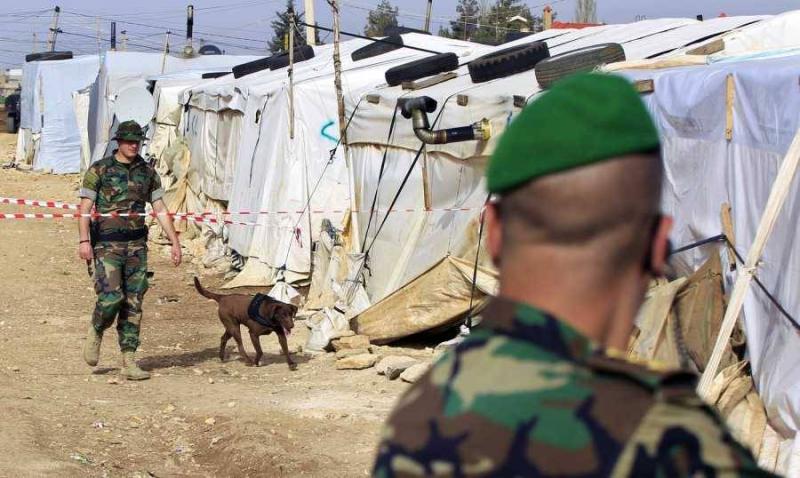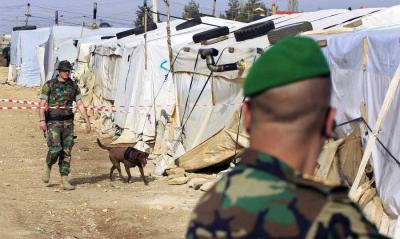A few days ago, "An-Nahar" reported information described by European diplomatic circles as "astonishing," related to the presence of large quantities of weapons in camps for Syrian displaced persons. This has raised significant concern among citizens and recalled the real security threat present in Lebanon, alongside the danger posed by the war in the south between Hezbollah and Israel.
According to the mentioned information, most of the recent batches of displaced individuals entering Lebanon are armed with light to medium weapons and explosives. Data from the Lebanese Army's Directorate of Guidance, which is released following the arrest of displaced individuals during raids and details the confiscated weapons, supports this claim. Furthermore, there are reports of large sums of money in the possession of displaced persons, who are supposedly in Lebanon due to the dire economic situation in Syria, although it is crucial to emphasize that this situation is not generalized across all displaced individuals.
More alarmingly, a security official reported that Syrian security forces are complicit in facilitating displacement to Lebanon, as they do not prevent illegal crossings. Moreover, state forces even guide newcomers to safe crossings, given that certain routes have been rigged with explosives. This indicates that the Syrian regime may be preparing for security shocks in Lebanon by enabling the passage of armed individuals.
The availability of large quantities and types of weapons among the displaced is undoubtedly not an individual endeavor aimed at personal protection. There are suggestions of dubious connections with the Syrian regime, which is allegedly pressing to facilitate the influx of these weapons into the displacement camps. Additionally, there is active Syrian intelligence work in the regions aimed at organizing the operations of these gangs, hinting at a more serious threat.
In this context, the role of the army, security forces, municipalities, and community groups in maintaining security in the regions is highlighted, particularly those suffering from sensitivities due to historical events between the locals and the Syrian army during the civil war. The focus is on the measures undertaken by official and security agencies to monitor the displaced individuals, control any suspicious motions, and maintain relative stability.
**Krich: Gangs Backed by the Syrian Regime**
Military and strategic expert Maroun Krich emphasizes that the medium-sized weapons (like RPGs) available among Syrian displaced individuals are not individualistic. The gangs to which these individuals belong do not aim for theft or drug trafficking, as the presence of such weapons indicates a sponsoring state aiding their access and compromising Lebanese security. In this context, fingers point towards the Syrian regime, which seeks to disrupt security in Lebanon and re-establish its influence through the displaced.
In an interview with "An-Nahar," Krich highlights the army's role in managing the situation relatively well, stating, "The army is doing its job to the fullest extent despite very modest resources that prevent it from enhancing its operations. It arrests violating displaced individuals and confiscates weapons. The army's role could expand if matters escalate in a specific area with the government's declaration of a state of emergency, allowing the army to take control temporarily."
Regarding the role of municipalities, Krich believes their function is limited to counting displaced individuals and gathering information about them, such as names, addresses, and reasons for residency. He insists that security matters should remain confined to security agencies to avoid legitimizing self-security phenomena and arming civilians, which could lead to conflicts over authority and even chaos between regions.
**Municipal Measures, Patrols, and Political Parties Involvement**
From the municipalities' perspective, according to several municipal and union heads, security measures are being taken, such as monitoring shops, factories, and establishments run by Syrians without official papers, organizing checkpoints, and controlling vehicles and motorcycles driven by displaced persons illegally. They are also checking residences to ensure the displaced have the necessary permits and are paying applicable fees, along with defining curfew hours.
Despite these measures and the confiscation of numerous illegal vehicles and residences occupied by displaced individuals without permits, Lebanese citizens are equally responsible for reporting foreign workers employed by them or residing in their homes. In this regard, cooperation in various areas has been weak, and citizens are urged to provide the necessary information to the municipalities.
However, municipalities refuse to bear full responsibility for the security situation, stating that security agencies bear this responsibility first and foremost, as they are mandated and equipped to enforce security measures, inspect homes and camps, and thoroughly investigate the displaced persons' backgrounds to ascertain their political motivations for entering Lebanon, whether economic or security-related.
According to information from "An-Nahar," many municipalities have begun organizing night patrols, both foot and vehicle, in suspicious areas and those out of the public eye, attempting as much as possible to conduct surveys to account for displaced individuals and gather information about them and their backgrounds, monitoring them for potentially suspicious movements. It has also been revealed that some political parties are taking on roles related to security and protection, conducting patrols in areas where they are present.
Nonetheless, these measures do not prevent a potential explosion of the situation in the event that there are real plans to destabilize the country. The number of Syrian displaced individuals in Lebanon has become unmanageable, with some areas seeing greater numbers than Lebanese citizens. Regardless of the army and security agencies' capabilities, they will not be able to prevent chaos due to the sheer volume of displaced persons, and thus existing solutions do not address the crisis fundamentally.
In conclusion, the security threat posed by a segment of Syrian displaced individuals linked to the regime of Bashar al-Assad persists as we enter the new year. The state, with its security and municipal institutions, may be able to maintain relative peace in the short term. However, the fear of chaotic scenarios orchestrated by Damascus could potentially activate its intelligence in Lebanon "at the push of a button," leading to a loss of control. In such cases, the currently adopted localized measures will be of no use.




